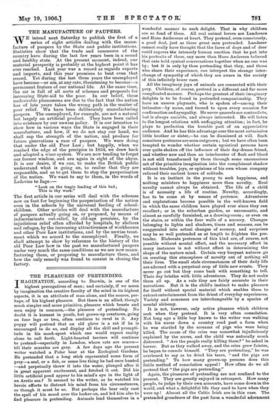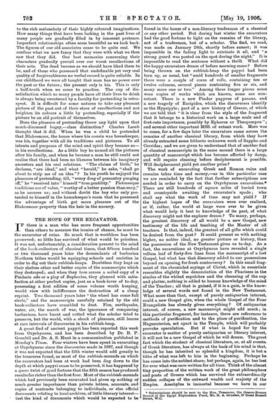THE PLEASURES OF PRETENDING.
IMAGINATION, according to Darwin, is one of the highest prerogatives of man; and certainly, if we mean by imagination the creative faculty of the mind in its highest aspects, it is an attribute of man alone, and the source, per- haps, of his highest pleasure. But there is an allied, though much simpler and more primitive, pleasure which beasts and men enjoy in common,—the pleasure of pretending. No doubt it is keenest in youth, but grown-up creatures, going on four legs or two, often continue to revel in it. Any puppy will pretend that an old glove is a rat if he is encouraged to do so, and display all the skill and prompti- tude in his mock-sport which one would expect reality alone to call forth. Light-hearted terriers will continue to pretend—especially in London, where rats are scarce— till their muzzles are grey. A few days ago the present writer watched a Polar bear at the Zoological Gardens. He pretended that a long stick represented some form of prey—a seal, or a fish, or some live thing he had once hunted —and perpetually threw it into the water, plunged after it in great apparent excitement, and fetched it out Did his little artificial pond appear to his mind's eye in the light of an Arctic sea ? It seemed to the writer, as be watched his heroic efforts to distract his mind from his circumstances, as though it must be so. But perhaps the bear only cast the spell of his mood over the looker-on, and led him also to find pleasure in pretending. Animals lend themselves in a wonderful manner to such delight. That is why children are so fond of them. All real animal lovers are Landseers and Hans Andersens at heart. They pretend, even consciously, a good deal, just as these great men pretended. Landseer cannot really have thought that the faces of dogs and of deer could express the intensely human emotion that he put into his portraits of them, any more than Hans Andersen believed that cats held cynical conversations together when no one was by; but it is only by thus pretending that they, and those who share their experience, can interpret the strange inter- change of sympathy of which they are aware in the society of this infinitely lower race.
All the imaginary joys of animals are connected with their prey. Children, of course, pretend in a different and far more complicated manner. Perhaps the greatest of their imaginary delights is to be found in pretended companionship. They have an unseen playmate, who is spoken of—among their intimates—by name, and turned to upon every occasion for confirmation and sympathy. He never quarrels nor contradicts, but is always amiable, and always interested. He will listen to the longest relations with unflagging attention; in fact, he plays to perfection the humble part of an appreciative audience. And be has this advantage over the most submissive little brother or sister,—he can be dismissed at will. Such conscious pretences are soon outgrown; but we have often been tempted to wonder whether certain egoistical persons have ever quite shaken off the influence of their day-dream friend, and whether now and then an interlocutor of flesh and blood is not still transformed by them through some unconscious act of the primitive imagination into the complaisant shadow without troubles, joys, or opinions of his own whose company relieved their earliest hours of solitude.
It is an instinct in the young to seek happiness, and nothing ministers to happiness more than novelty. Real novelty cannot always be obtained. The life of a child is of necessity a life of routine. Novelty, accordingly, has to be come at by means of pretence. Adventures and explorations become possible in the well-known field in which the same children have played ever since they can recollect; or in the suburban garden, as unromantic, and almost as carefully furnished, as a drawing-room ; or even on the stairs, or within the four walls of a nursery. Changes belonging to lights and shadows, times and seasons, can be exaggerated into actual changes of scenery, and surprises may be so well pretended as at length to frighten the pre- tender. Elaborate pretences of this kind are, of course, not possible without mental effort, and the necessary effort in many instances is not without effect in determining the shape of the mature mind. Certain very buoyant natures go on creating this atmosphere of novelty out of nothing all their lives. The small stale circumstances of their daily life are adorned with a perpetual crop of little new events. They never go out but they come back with something to tell. Their day bristles with little adventures. They do not make them all up. As a rule they are fairly accurate in their narrations. But it is the child's instinct to make pleasure for itself without special material which enables them to extract entertainment from the driest of everyday experiences. Variety and sameness are interchangeable by a. species of mental alchemy.
It is not, however, only active pleasure which children seek when they pretend. It is very often consolation. Not long ago a little boy known to the writer was walking with his nurse down a country road past a farm when he was startled by the screams of pigs who were being killed. The cause of the cries was somewhat injudiciously explained by the nurse, and the child was naturally much distressed. "Are the people really killing them?" he asked in horror. But as they walked away, and the cries grew fainter, he began to console himself. "They are pretending," he was overheard to say as he dried his tears, " and the pigs are pretending." To how many grown-up persons does this futile method of consolation appeal ! How often do we all pretend that " the pigs are pretending."
Again, the pleasures of pretending are not confined to the present. They are greatly enjoyed in retrospect. How many people, to judge by their own accounts, have come down in the world, and what a delightful life they used to have when they were up ! Almost all the Celtic Irish are in this case. The pretended grandeurs of the past form a wonderful adornment
to the rich melancholy of their highly coloured imaginations. How many things that have been lacking in the past lives of many people are gradually filled in by innocent pretence. Imperfect relationships often seem beautiful as we look back. The figures of our old associates cease to be quite real. We confuse what we now fancy that they were with what we then saw that they did. Our best memories concerning their characters gradually prevail over our worst recollections of their acts. The dead become as we should have liked them to be, and of those who possessed that undefinable yet very real quality of forgiveableness no verbal record is quite reliable. In our childhood we were all taught that man has no power over the past or the future ; the present only is his. This is only a half-truth when we come to practice. The cup of dis- satisfaction which so many people have all their lives to drink is always being sweetened by a faculty for pretending in retro- spect. It is difficult for some natures to take any pleasant picture of the past out of their store of recollections and not heighten its colours a little by pretending, especially if the picture be an old portrait of themselves.
Does the pleasure of pretending throw any light upon that much-discussed bogey,—class distinction ? Charles Lamb thought that it did. When he was a child he pretended that Blakesmoor, the house where his cousin was housekeeper, was his, together with all its traditions and pictures. To all intents and purposes of the mind and spirit they became so— in his recollections. As a little boy he named all the pictures after his family, and when he became a man he still could not realise that there had been no likeness between his imaginary ancestors and his real relations. "The claims of birth," he declares, " are ideal," and what "herald," he asks, " shall go about to strip me of an idea " ? In his youth be enjoyed the pleasures of pretending, till, " every dreg of peasantry purging off," he "received into" himself "true gentility." Picturesque traditions are of value, " worthy of a better passion than envy," as he assures us; and without doubt the boy who only pre- tended to himself in the housekeeper's room that he possessed the advantage of birth got more pleasure out of the Blakesmoor property than the heir in the nursery.











































 Previous page
Previous page